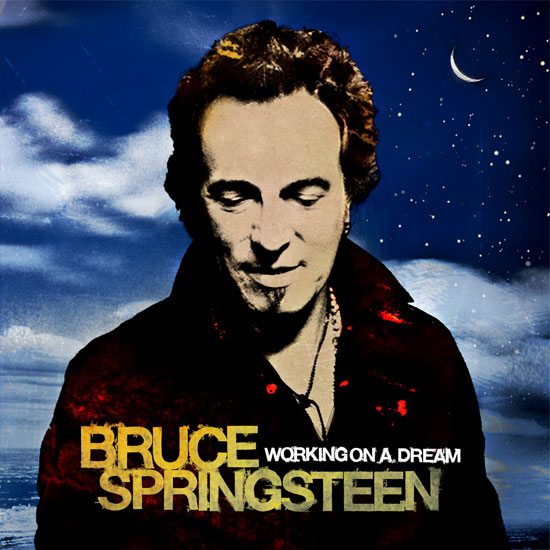
Working on a Dream (2009)

1. Outlaw Pete
2. My Lucky Day
3. Working on a Dream
4. Queen of the Supermarket
5. What Love Can Do
6. This Live
7. Good Eye
8. Tomorrow Never Knows
9. Life Itself
10.Kingdom of Days
11.Surprise, Surprise
12.The Last Carnival
13.The Wrestler
Coming a mere fifteen months after Magic, Bruce Springsteen’s Working on a Dream finds itself inevitably shadowed by its predecessor. Same producer (Brendan O’Brien), same returning E Street Band, and a continuation of that glossy, tightly constructed sonic palette. But while Magic trafficked in cynicism cloaked in anthemic sheen, Working on a Dream gestures—tentatively, at times clumsily—toward hope. The intention is clear; the execution, less so.
The album opens with the sprawling Outlaw Pete, an eight-minute quasi-mythic Western that veers closer to cinematic pastiche than narrative songcraft. It shouldn’t work—and yet, it does. Springsteen leans into the theatricality with a conviction that makes its train-whistle rhythms and cowboy cadence feel earned. It’s the closest thing on the album to a statement of purpose: a tall tale with more symbolic freight than first appears.
The early stretch continues strongly. My Lucky Day and the title track deliver precisely the sort of uplift the album promises, though filtered through Springsteen’s matured sensibility. One suspects these songs, particularly Working on a Dream, owe their buoyancy as much to the spirit of 2008’s political climate as to personal optimism. Springsteen has always been political, but here his hand is light—rhetoric gives way to melody.
Yet from there, the ground becomes less sure. Queen of the Supermarket, a peculiar tale of infatuation with a grocery clerk, stumbles badly. Cloaked in lush orchestration and supermarket-aisle romanticism, it lands not as innocent fantasy but as oddball misfire. It’s the sort of narrative that might have charmed in Springsteen’s twenties; now, it feels forced, if not slightly unsettling.
Production, too, emerges as a central issue. There is a smoothness, a layering of instrumentation that often serves to blur rather than illuminate. The E Street Band, long hailed for their raw vitality, is too often buried beneath digital polish. The result is a sonic uniformity that makes several mid-album tracks indistinguishable on repeated listens—not for lack of ideas, but for lack of space to breathe.
Still, when Springsteen breaks from form, the effect can be striking. Good Eye, a snarling, bluesy number, erupts with primal urgency—almost as if the walls of the studio could no longer contain it. Tomorrow Never Knows, despite its title’s Beatlesian echo, is pure country-Western, and surprisingly effective. These moments of stylistic divergence hint at an album that could have been bolder had it trusted itself more.
Toward the end, Springsteen finds emotional footing again. The Last Carnival, a mournful and poetic tribute to the late Danny Federici, feels weighty and sincere—a quiet counterpoint to the album’s more polished surfaces. The bonus track The Wrestler, written for Darren Aronofsky’s film, concludes the set with humble dignity. Sparse and restrained, it reminds us that beneath the layers, the songwriter still knows when to say more by saying less.
Working on a Dream may lack the cohesion or punch of Springsteen’s finest work, but it is not without merit. It is a document of an artist—older now, more reflective—attempting to reconcile his past voices with present realities. If the result occasionally falters under its own production choices or tonal shifts, it remains, at its best, a reminder that even Springsteen’s missteps have something to say.
Go back to the main page
Go To the Next Review